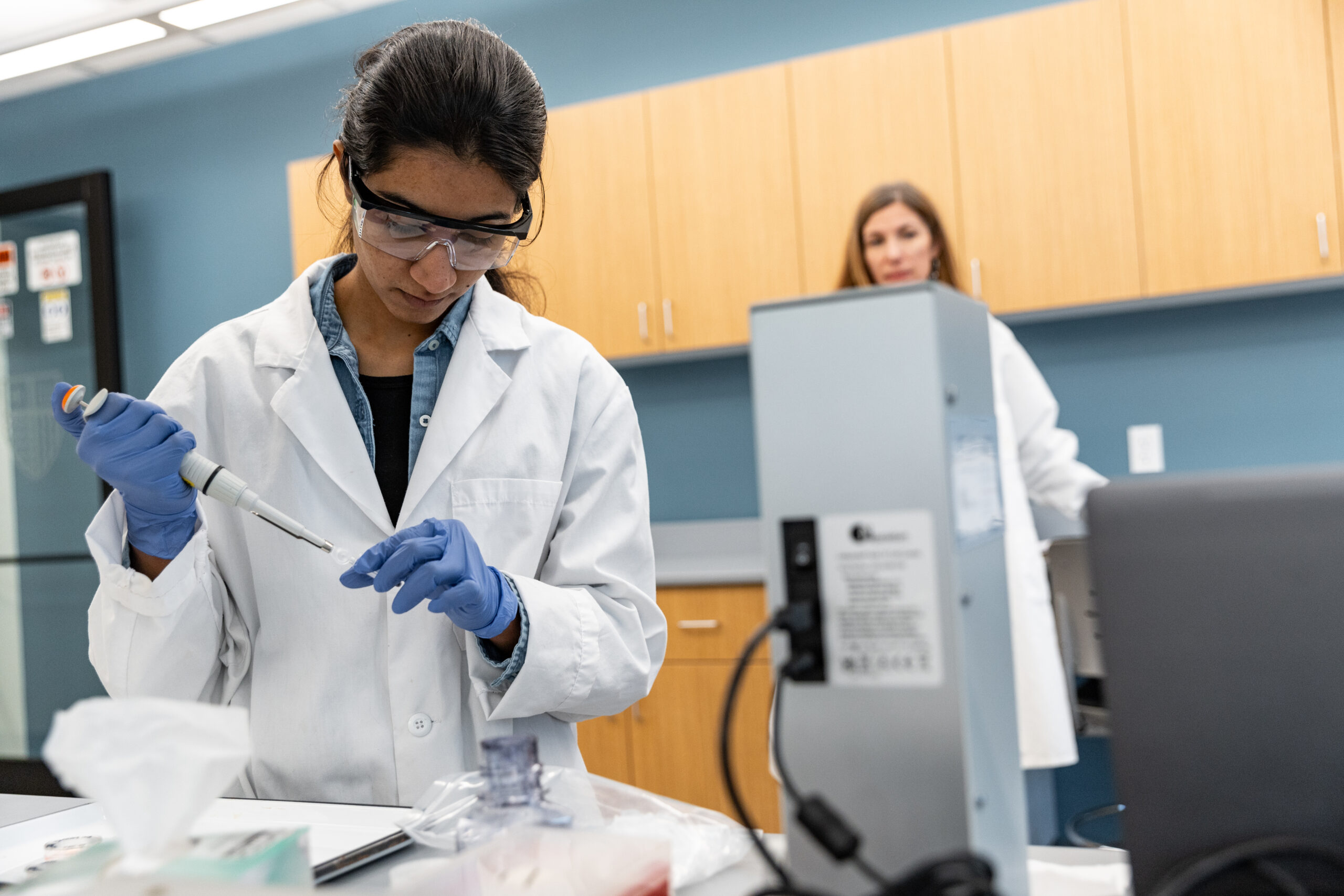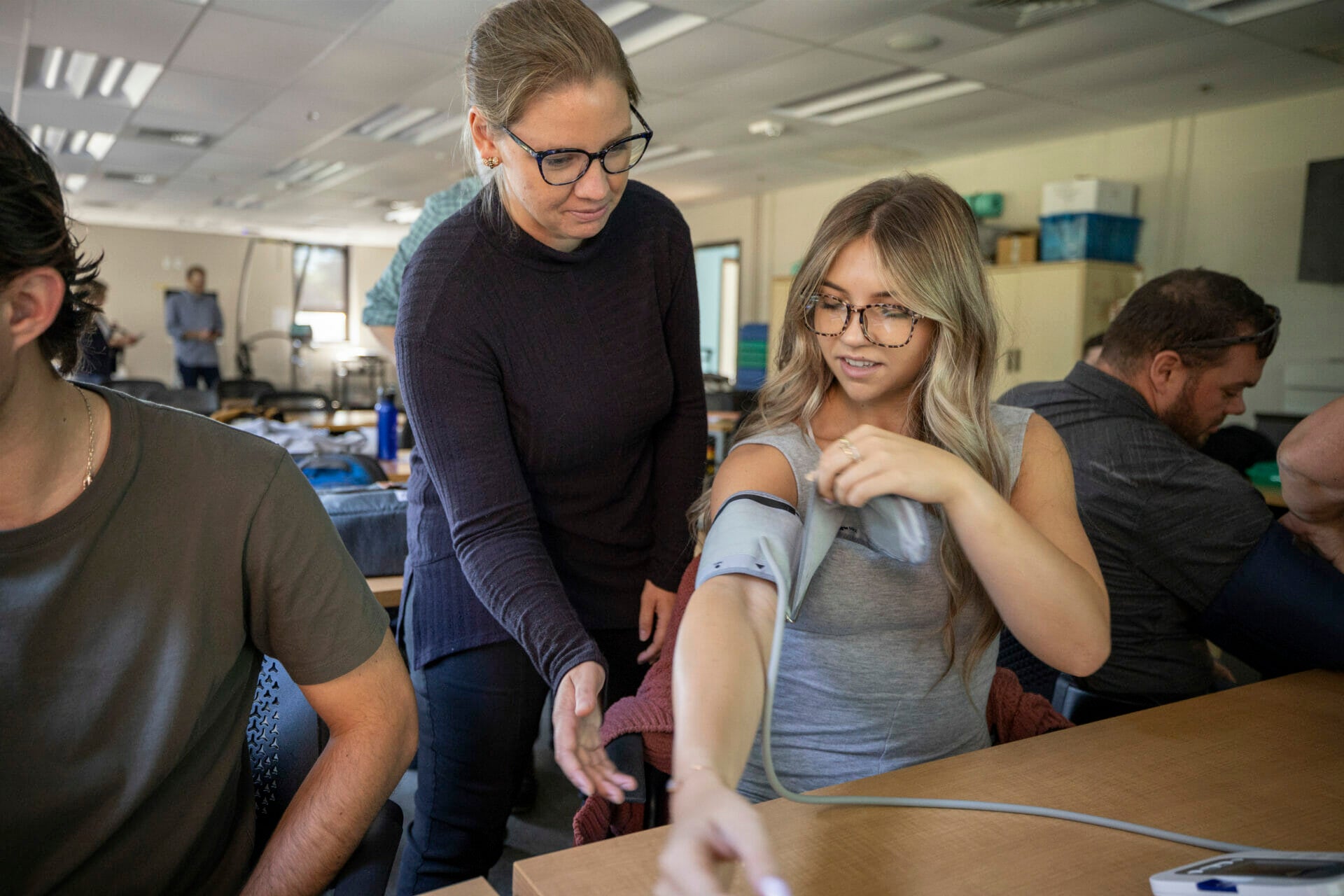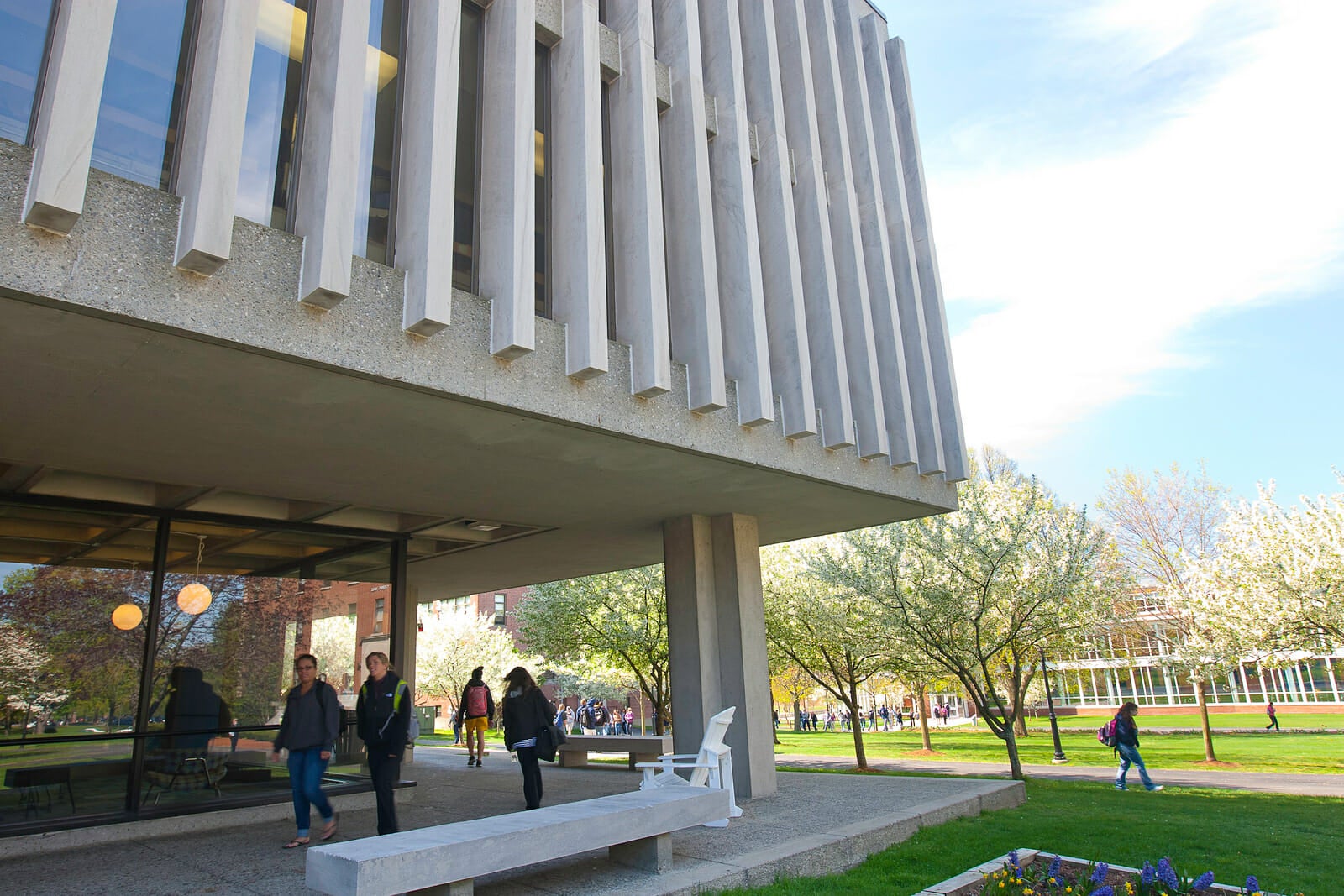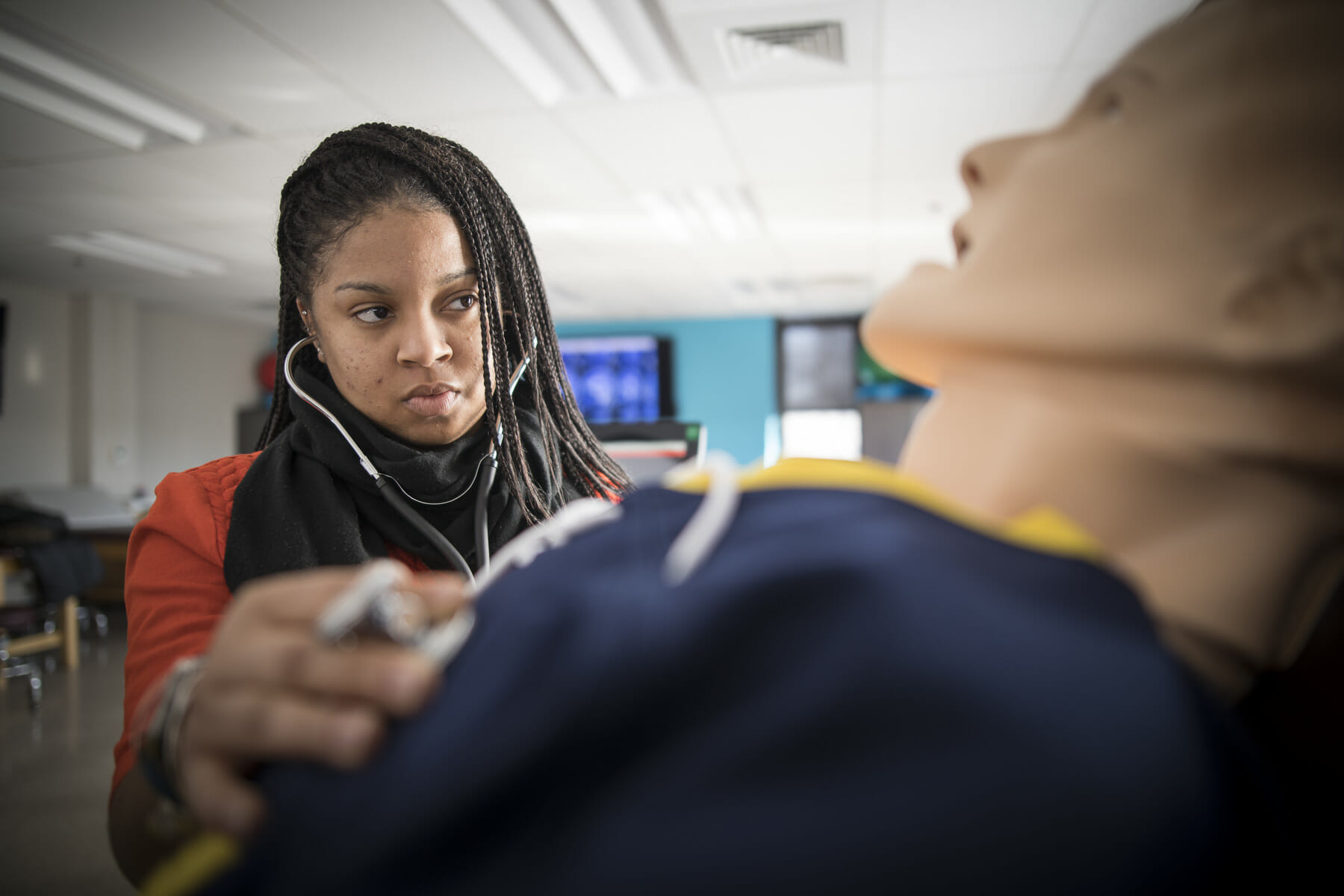Bachelor of Science (B.S.) in Public Health
100% of public health majors participate in at least one internship, co-op, fieldwork or practicum.
As a public health major, you’ll gain real-world experience that helps you improve community health and make an impact. Get hands-on learning in labs and the field to build the skills you’ll need for your career or grad school.
Public Health Degree at a Glance
Program Type
Major
Mode of Study
On Campus
Co-op/
Internship
Guaranteed
Est. Time
4 Years
Start Terms
Fall, Spring
Cost
School
Accreditation
Tell Me More About Merrimack's Public Health Major
"*" indicates required fields
The Public Health Major
Learn to analyze health issues, develop policies and create programs to prevent disease and promote health. You’ll be equipped to work in a variety of settings from hospitals and nonprofits to government agencies and research institutions – all with the goal of improving health outcomes on a larger scale.
What You'll Study
As a public health major, you’ll gain the expertise to tackle pressing health challenges at the community and population levels—shaping policies, promoting prevention and advancing population health. This program prepares you for impactful careers in government, nonprofits, research and beyond, empowering you to improve lives on a large scale. With a strong foundation in evidence-based practices and systemic health solutions, our graduates are ready to make a difference—or pursue advanced studies for specialized leadership roles in the field.
Anatomy and Physiology
Global Public Health
Nutritional Sciences
Health Behavior and Promotion
Epidemiology
Health Policy
Healthcare Systems
Biomedical Ethics
Ethics in Public Health
Environmental Health
Skills You'll Learn
As a public health major, you’ll develop a range of skills to tackle health challenges effectively, making a lasting impact on both individual and community health. Here are key skills you’ll learn:
Data Analytic & Research Methods
Health Equity & Social Determinants
Health System & Policy
Health Promotion & Wellness Management
Global Health Awareness
Disease Control

Public Health Courses You'll Take
Global
Public HEalth
HSC 3103
Study biological, socioeconomic and environmental contributors to health and disease in populations around the world. Investigate the determinants of health, how health status is measured and review the burden of disease, risk factors and approaches to global cooperation.
Foundations of
Health Policy
HSC 3332
An introduction to health policy, this course will provide an overall understanding and analysis of a range of health policy issues and the US health care system, including health insurance, health economics, individual rights in health care and health care quality and access.
Health Behavior
and Promotion
HSC 2500
Explore and apply theoretically based principles and strategies to real-life cases. Emphasis is placed on improving students’ competency in understanding of health behaviors in the modern world and design of theory-based interventions to improve health behaviors.
See All Courses & Options Available to Public Health Majors
Public Health Major Requirements
General Education Requirements
In addition to the major requirements below, you will also need to complete Merrimack’s general education requirements. To see more details about the major, please visit catalog.merrimack.edu.Sample Four-Year Schedule - Curriculum Guide
Why Choose the Bachelor of Science in Public Health?
Merrimack’s Bachelor of Science in Nutritional Sciences is an empowering decision for anyone passionate about health, science and making a real-world impact.
REAL-WORLD EXPERIENCE, GUARANTEED
You’ll have the chance to collaborate with faculty on cutting-edge research or intern at top institutions like Beth Israel Deaconess, Boston Children’s Hospital and the Massachusetts Department of Public Health.
HELP COMMUNITIES IN NEED
Design programs and policies that improve community health, reduce inequality and promote wellness. Take on pressing issues like fighting disease, bridging health gaps and solving environmental problems.
POSITIVE RETURN ON INVESTMENT
Public health is a vital part to our society's wellbeing. From climate change to global pandemics, public health majors will be consistently addressing future health challenges.
Career Outlook: Where Can a Public Health Degree Take You?
Career Outcomes Rate
95% of the undergraduate class of 2024 in Nursing & Health Sciences were either employed, participating in voluntary service or continuing their education within nine months of graduation.
Experiential Learning
100% of the undergraduate public health class of 2024 participated in at least one internship, co-op, clinical, practicum or research opportunity while at Merrimack.
Graduate School
Northeastern University, Sacred Heart University, MCPHS and Merrimack are just some of the graduate programs Nursing and Health Sciences graduates are attending.
Jobs with a Public Health Degree
Upon completing our program, you’ll be well-equipped to pursue graduate study or a career in public health and related disciplines. Positions may include:
- Public-health analyst
- Hospital administrator
- Epidemiologist
- Biostatistician
- Health inspector
- Health educator
- Marketer in a health-related organization
- Practitioner
Where Merrimack Public Health Graduates Work & Intern
Brigham and Women's Hospital
Intern
St. Ann’s Home & School
Intern
Stonehill at Andover
Resident Care Associate
CVS Pharmacy
Pharmacy Technician
ReproDiscovery Lab
Research Assistant
Dartmouth College
Master’s of Public Health Program
Winchester Hospital
Laboratory Technician
Optima Sports Therapy
Rehabilitation Aid
Beyond the Classroom

Student Life
You’ll have endless opportunities to find your fit, get involved and pursue what makes you happy—all while making lifelong friends (and memories!).
Explore your passions alongside others with similar interests, whether that means a cappella singing or outdoor adventuring.
- 80+ student organizations
- Division I Athletics, club and intramural sports
- Beloved traditions like Homecoming, Block Party and Spring Concert
- Fraternities and sororities

Internships & Co-Ops
Our students gain valuable work experience and connections with leading companies through guaranteed internships and the Warriors at Work co-op program. Recent placements include:
- Interning with Homeland Security Investigations, shadowing special agents
- Interning at Delta Tech-Ops, working in components engineering
- Working as a tax intern at Baker Tilly

Research with Faculty
With access to cutting-edge tools, undergraduate students can collaborate with faculty on research projects that can lead to presentations and publications.
- Explore the complexities of the human mind in a state-of-the-art psychology lab.
- Understand how inflammation affects immune cell aging in our Shared Instrumentation and Research Facility.
- Build fully functional battle bots for competitions.

Study Abroad
Global Merrimack provides transformative, once-in-a-lifetime experiences.
Our 30+ study abroad programs include semesters abroad, faculty-led trips and international internships.
- Explore and study in the Dominican Republic or Iceland.
- Immerse yourself in cities like Dublin, Madrid or Rome.
- Experience a semester at sea or intern in vibrant cities like London or Paris.

Service Learning
Community and service are at the heart of our Augustinian mission.
Over 1,000 students work together to engage in hands-on service learning projects each year, supporting our communities and those in need.
- Participate in our campus-wide Mack Gives Back volunteer days.
- Spend your winter, spring, or summer break on an immersive SEND trip in the U.S. or abroad, helping those in need.
- Tutor students in nearby school districts.
See for Yourself
Programs Related to the Public Health Major
Explore other areas and where they can take you.
Take the Next Step (We're Here to Help)
At Merrimack, we are ready to meet you where you are and get you where you want to go. And, we make the process simple along the way!
Upcoming Events

Info Session & Campus Tour
Monday-Friday & Most Saturdays
Attend a 20-minute info session led by an admission counselor and then take a student-led campus tour. Registration is required.
Merrimack College Awards & Recognition
U.S. News & World Report | Best Regional Universities North (2026)
- Most Innovative Schools (#8)
- Regional Universities North (#38)
- Best Undergraduate Teaching (#20)
- Best Colleges for Veterans (#16)
- Best Value Schools (#52)
Tell Me More About Merrimack's Public Health Major
"*" indicates required fields







